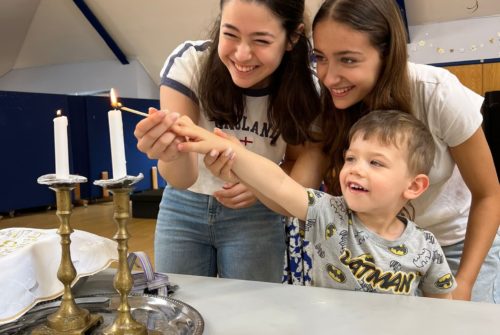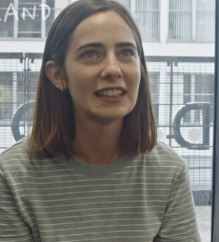Pekudei – Edgware and Hendon Reform Synagogue – 28-03-25 – The Ideal Reform Jew
When I was a student Rabbi in the early 1990 I served two very different congregations: Hendon Reform Synagogue, yes Rabbi Steven was my supervisor then and Stewart Abbey was the Chairman at the time and Nurit Heath the Education Director – and The Liberal Jewish Synagogue in St John’s Wood – I trained at both for two years.
On the wall of the rabbi’s robing room at the Liberal Jewish Synagogue there is a framed quotation intended, I assume, to inspire visiting Rabbis and student Rabbis to give of their best whilst leading worship services and other activities at the synagogue. It is entitled – “The Perfect Rabbi” and it is full of useful advice as to how any one of us might become this paragon of rabbinic excellence. This is what it says – and it applies equally to a male or female Rabbi:
The perfect Rabbi preaches for exactly fifteen minutes. He condemns sin but never upsets anyone. He works each day from 8.oo am until midnight and, in his spare time enjoys his hobby of acting as assistant caretaker for the synagogue. He cheerfully accepts his salary of £10,000 per year and nevertheless wears good clothes, buys good books, drives a decent car and gives about £10,000 annually to the poor. He is 28 years old and has preached for 30 years. He has a burning desire to work with teenagers and spends all of his time with the elderly. The perfect rabbi smiles all the time with a straight face because he has a sense of humour that keeps him seriously dedicated to his work. He makes fifteen visits each day on member families, the housebound and hospitalised. He spends all his time winning over the unaffiliated Jews and is always in the office at Shul when you phone him or pop in .
Challenging stuff – and of course impossible. Yet there is some truth in the notion that we ask our Rabbis and Cantor to be and do contradictory things. But the way that we expect him or her to cope with these demands is to create and operate a balance between them – yes to be out visiting, attending conferences and meetings but also to ensure that he is accessible. Yes to work with youth but also to have time for the elders of the congregation. Indeed the most creative aspect of the Rabbinate for me, and I am sure for many of my colleagues, is precisely how each of us personally fashions a workable balance of all the aspects of synagogue and Jewish life in which we could be involved.
So that is an ideal Rabbi – what though to a Rabbi is the ideal congregant? Possibly a dangerous path on which to tread from the Bimah but nevertheless one which has was trodden a while ago by the Masorti movement. At a recent conference of this, the fourth movement in British Jewry – which is characterised by being Orthodox in practice though not in theology – an attempt was made by the participants to come up with a definition of the “ideal young Masorti Jew”. What they came up with was of far more serious intent than the definition of the perfect rabbi with which I just presented you.
It read, as reported in the Jewish Chronicle – “the ideal young Masorti Jew is one who is Shabbat observant and keeps all festivals, has a knowledge of Israel and spoken Hebrew and feels at home in any synagogue.” This description as is the JC’s wont was not entirely as it appeared at the conference itself There was some additional preamble concerning how the ideal young Masorti Jew expresses his or her love of Judaism by how he lives his life and how he is both tolerant and flexible in relation to other Jews.
When I heard this description of the ideal Masorti Jew it was not very surprising that it would probably be little different to a similar description if one were available of the ideal Orthodox Jew – perhaps the Orthodox Rabbonim would want to strike out the bit about feeling at home in any Synagogue. It is not surprising because, attitudes aside, the practice of Masorti Judaism is not intended to be different from that of Orthodoxy.
But what about us? Could we come up with a description of the ideal Reform Jew?
Perhaps to propose such a task is oxymoronic from the start. Can a religious movement such as ours which proudly asserts the responsible autonomy of each of its members ever lay down an ideal that inevitably leaves little room for individual interpretation? I believe, though that, we can – but we would not go about it in the same way as those to the right of us in the Jewish religious spectrum.
We would not be laying down absolutes concerning Shabbat and festival observance nor Hebrew competency. Rather we would be taking much the same approach as has been with Judaism ever since its inception. This approach is one whereby we state the poles which give the boundaries of the Jewish endeavour and consider ideal the Jew who expends his or her energy and commitment on finding their own place within those boundaries.
Rabbi Leo Baeck, the leader of pre-war German Liberal Jewry and first President of this Synagogue, memorably expressed this notion in his book “The Essence of Judaism”. Among the messages of this book was the reminder that Judaism is a religion based on polarities – God, in Judaism is both transcendent (far above our understanding) and immanent (close to us even inside of us). God in Judaism both commands (an action of immanence, dealing directly with humanity which gives rise to most Jewish practice) and is shrouded in mystery and inapproachability (God’s name is not pronounced, God’s identify cannot be pictured). Judaism is both particular and universal, concerned with our own people and with the whole world. The Jewish world requires both a strong and creative Israel and a strong and creative Diaspora. The list goes on – of these apparent contradictions, in the tension between which Judaism actually thrives.
Even our Torah portion today exists within these tensions. – the Mishcan was the place where God dwelt – yet God dwells everywhere – within the tension between these statements was that which enables us to focus on worship in the synagogue whilst not leaving Judaism behind when we go out into the street.
So to say an ideal Jew, is this, does that, believes the other is, I believe to miss the point of the essential dialectic of Judaism. What then is the ideal Reform Jew? I would suggest that he or she is a Jew who is thoroughly engaged in the process of making his or her own balance between the conflicting demands of Judaism. He learns from Jewish sources and non Jewish sources, he observes Shabbat in a way that enables him to remain part of the wider society, he cares for the welfare of Jews but is also open to the needs of the wider society, he prays in Hebrew and can also express himself spiritually in his own vernacular. He lives in the contemporary society of his country but does so proudly as a Jew. One could continue through the whole catalogue of Jewish experience building a picture of the hundreds of ways in which an ideal Reform Jew needs to create balance within their life. The very creativity required to make that balance is the essence of the satisfaction available to the Reform Jew – and why it is harder to be a religious Reform Jew than to be a Jew who truly subscribes to the principles of a more fundamentalist Judaism – that therefore does not give him such freedom of action or thought.
The ideal Reform Jew then is something like this – a Jew who is thoroughly engaged in the process of making a meaningful balance between the conflicting demands of Jewish learning, Jewish worship and Jewish action and who lives within a community which can help him or her to do so.
I could have given this sermon in Hendon Reform Synagogue when I was a student Rabbi, but I also could have given this sermon in the Liberal Jewish Synagogue and just substituted the world Liberal for the word Reform.
The ideal Liberal Jew then is something like this – a Jew who is thoroughly engaged in the process of making a meaningful balance between the conflicting demands of Jewish learning, Jewish worship and Jewish action and who lives within a community which can help him or her to do so.
Now thirty years after my student Rabbi experience at Danescoft and the LJS our Reform and Liberal Jewish movements are for the third time in their history asking themselves a question. Shall we merge as an organisation and keep our Synagogues able to find their own answers to the questions of what makes for an ideal Progressive Jew of either Reform or Liberal minchag. Your Council – charged with voting what EHRS wants – needs your guidance on this question. To merge or not to merge. Please come on Sunday morning April 27th to our open forum to discuss the question, hear enthusiasms and address concerns. Your voice is needed.
You may not ever have an ideal Rabbi here at EHRS – but together we can build an ideal congregation in the ideal shape of a movement.



